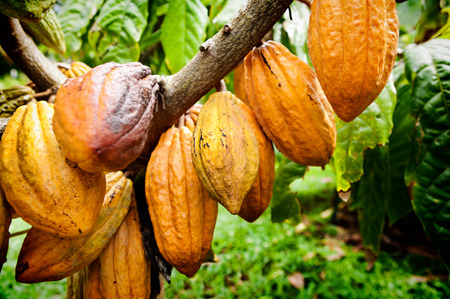Sustainable cocoa farming: Barry Callebaut intensifies cooperation with Ghana and Ivory Coast authorities
Category: Cocoa
 (Food Ingredients First) – Barry Callebaut has joined forces with cocoa authorities in Ghana and the Ivory Coast to clear and replant trees infected with the swollen-shoot virus (CSSV) disease. The move comes as part of a more comprehensive project working towards a model for sustainable cocoa farming. The manufacturer of high-quality chocolate and cocoa products has signed letters of intent with both the Ghana Cocoa Board (COCOBOD) and the Coffee Caco Council of Côte d’Ivoire (Conseil Café Cacao).
(Food Ingredients First) – Barry Callebaut has joined forces with cocoa authorities in Ghana and the Ivory Coast to clear and replant trees infected with the swollen-shoot virus (CSSV) disease. The move comes as part of a more comprehensive project working towards a model for sustainable cocoa farming. The manufacturer of high-quality chocolate and cocoa products has signed letters of intent with both the Ghana Cocoa Board (COCOBOD) and the Coffee Caco Council of Côte d’Ivoire (Conseil Café Cacao).
Eradicating child labor and supporting women and young cocoa farmers are also significant focuses of the collaboration in both countries.
“This letter of intent is an important step towards the design of a new model for sustainable cocoa farming. Combining the expertise and resources on the ground of both the COCOBOD and Barry Callebaut will lead to more impactful interventions and accelerate the progress towards a sustainable cocoa farming sector in Ghana, the second largest cocoa producer in the world,” says Antoine de Saint-Affrique, CEO of Barry Callebaut.
Also, the cooperation in both countries will include agroforestry, more specifically income diversification for cocoa farmers and the planting of shade trees.
And all parties will intensify cooperation on community-led engagement towards the “eradication of the worst forms of child labor,” according to Barry Callebaut.
“Ensuring the coexistence of cocoa farming with the protection of our country’s classified forests is a high priority for the Ivorian government, as is also exemplified by the Cocoa and Forests Initiative Framework for Action,” says Alain Richard Donwahi, Minister of Waters and Forests Côte d’Ivoire.
“The letter of intent cements the strategic partnership between government and industry required to make this coexistence happen.”
Clearing CSSV infected cocoa trees and replanting cleared areas with young cocoa trees, shade trees and additional crops, will sustain and diversify farmer incomes.
The swollen shoot virus decreases cacao yield within the first year of infection and usually kills the tree within a few years.
“Through the clearing of CSSV infected cocoa trees, we have the opportunity to ensure a sustainable cocoa farming model in Ghana further. And while exploring agroforestry at the same time, by replanting the cleared areas with young cocoa trees, shade trees and additional crops to diversify the income of Ghanaian cocoa farmers,” says Joseph Boahen Aidoo, Chief Executive COCOBOD.
The initial outcomes of the collaborations are expected to be presented early next year.
In January, the Swiss Platform for Sustainable Cocoa was launched with Barry Callebaut as one of the founding members. This platform will play an essential role in creating the market pull for sustainably sourced cocoa and includes 41 players from the Swiss cocoa industry who have joined together to form the Swiss Platform for Sustainable Cocoa.
The platform members have agreed on the goal that by 2025, at least 80 percent of the cocoa-containing products imported into Switzerland should come from sustainable cultivation.
In addition to Barry Callebaut, the founding members include the industry association CHOCOSUISSE, manufacturers, importers, and distributors of cocoa-containing products, Swiss retailers, the State Secretariat for Economic Affairs (SECO), non-profit organizations and research institutions.

